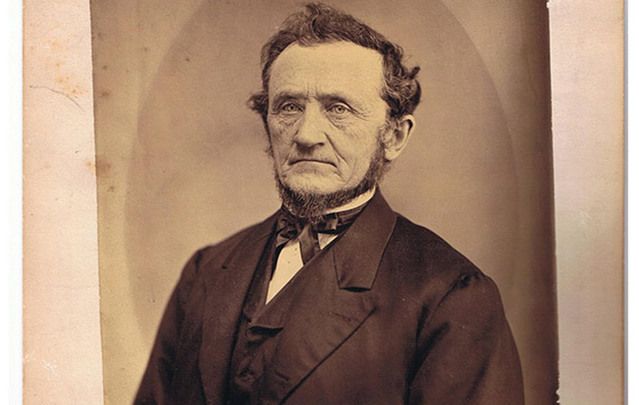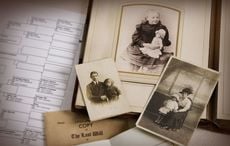On the eve of the great Civil War an explosion of sorts took place at St. James Church in Carthage, a small community in the northern reaches of New York State.
On that fateful final Sunday of 1860, a quite public disagreement between the Irish parishioners and their priest and bishop boiled over during mass and sparked a melee that featured broken furniture, bloodied heads and a priest fleeing for his life.
This event, we learned, would result in our common ancestor, Richard Gallagher, being excommunicated from the Church he dearly loved and served.
Imagine our surprise when, as the product of simply searching for our roots, this previously unknown incident about our little known forbear came to light.
The following is the story of Richard Gallagher and how, in tracing our roots, we discovered that we were long lost relatives.
Kathi Barry Johnson — Greece, NY
When my 90-year-old aunt Frances Barry died in 2011, my family lost the keeper of much of our ancestral memorabilia. It was thus that her file folder, filled with Gallagher/Barry family history, came into my possession. The treasure trove of pictures, family trees and yellowed newspaper clippings prompted me to find out if the stories I'd heard over the years were actually true.
Most of our family research had focused on the Barry side of the family, my maiden name. My Irish immigrant great-great grandfather from County Westmeath, Richard Gallagher, was periodically mentioned but much neglected in our genealogy search. All I had heard about him was that he was a successful furniture dealer in Carthage, NY sometime in the mid 1800s.
We knew that Gallagher also had something to do with the undertaking business, a not uncommon adjunct to the cabinetmaking trade. Since they made the caskets, why not do the rest and bury the poor souls? One of the more lurid stories passed down to us, connected to that aspect of his business, claimed that those fabled Irish wakes were much in vogue at his establishment. One yarn concerned a hunchbacked corpse whose body had to be tied down to fit into the casket. During the festive wake, the rope came loose and the dead man popped up like a champagne cork. One could only imagine how that was received by the startled mourners.
When I took up the Gallagher search, I focused on trying to know what our patriarch was like as a person. After reading the inherited file, which included a tattered obituary from "The Carthage Republican Tribune," a picture of my great-great-granddad began to emerge.
I joined Ancestry.com to pursue my search but information on my great-great grandfather was practically nonexistent. When, on a lark, I Googled his name, much to my surprise I came across a book titled “The Bishop’s Curse,” by Raff Ellis.
Great-great granddad Richard was the principal character!
The book is a thoroughly well researched historical novel centering on a major dispute my ancestor and his Irish immigrant confreres had with the Catholic Church. I quickly ordered the book and greedily consumed it as soon as it arrived. It was so invigorating to read about those intrepid people who dared the uncertain voyage to America—people such as O'Leary, Walsh, Brady, Clarke and McManus—who came from counties Monaghan, Mayo, Meath, Westmeath, Cork and Kerry.
From the book I learned that Gallagher had founded the first retail furniture store in all of Jefferson County. His cabinet shop made some of the finest pieces available in the area, and I have inherited one of his creations. It is a writing desk that was owned by my great-grandmother. I like to think that my desk might actually be the same writing table that my brave great-great grandmother used when she dared write her letter of complaint to the bishop. It was unheard of for women to assert themselves in those days and to involve themselves in the disputes of men.
Gallagher was not only a successful businessman and longtime church trustee, but also dabbled in politics. What a surprise—an Irishman engaging in politics.
According to the book's author, the church dispute centered about widespread unhappiness with the frequency of services at St. James.
The parish had been established in 1818, and was the fourth oldest Catholic house of worship in all of New York State. The lack of a priest for periods as long as four months caused people to go without the sacraments and be buried without the benefit a proper requiem. As a result, the devout head trustee Gallagher became involved in a protracted and acrimonious disagreement with the bishop and his parish priest, Fr. Michael Clarke (a former local shoemaker).
This in turn resulted in the introductory "explosion" in the church. The account of the battle was supplemented with transcripts of the actual letters that Gallagher wrote to his bishop—which made the discovery all the more exciting. I could now read my ancestor's actual words from 160 years ago.
I couldn't help but take notice of an interesting sidelight to the story that directly affected me. The miscreant priest, who had fled for his life, was ultimately dispatched to another parish (a common practice even back then).
Two years later, after the hoopla died down and the church was reopened, a new priest arrived as pastor of St. James.
His name was Fr. Michael Barry, and soon after arriving, as was customary in those times, family members took up residence with him. One of his brothers was William Barry, who ultimately became my great-grandfather as a result of his marrying Richard Gallagher's daughter, Frances. Just imagine! If Richard Gallagher hadn't had his dispute with the Church, I may have never had been born.
That's the interesting thing about searching your family roots. You never know what surprises you'll turn up on the ancestry trail.
Chris Gallagher Ekstedt — High Point, NC
My grandfather, whose name is W. Matthew Gallagher, was barely known to my family, and we certainly didn't know his parents' names. The Gallagher surname is hardly uncommon, and although we suspected we had many "northern" cousins, all contact with them had been lost eons ago.
As often happens in families, once distance is put between them, contact diminishes over time until it is lost entirely. In our "southern branch" of the Gallagher family this came about because my father, John, who was born in Watertown, NY and had moved to Rochester with his family, answered the call to arms for WWII. While in the service he met my mom in Greensboro, NC and after the war they got married and settled there.
Also involved was the not uncommon mother-in-law disapproval of spouse choice, and this contributed to the ultimate estrangement and loss of contact.
I had recently started a family tree online and had listed nearly every other known member in our branch of the family—sans our great-grandfather. We seemed to know that he was a furniture dealer and in the undertaking business, but that was the extent of our knowledge.
My brother Tim, who has been our most diligent ancestry detective, found our grandfather's marriage certificate, which listed his father and mother's names—Richard and Adelaide Gallagher. We finally knew their names, but that was all. We knew about his son Matthew, our grandfather, and that he was a butcher in Watertown, NY—a city 16 miles to the west of his birthplace of Carthage.
Another tale that had been passed down was that great granddad had fought in the Civil War and was a prisoner at the infamous Andersonville stockade. Now, that was something exciting and worth looking into. Tim spent a good deal of time chasing it down, unsuccessfully.
He scoured Civil War databases and wrote to historians that he tracked down on the internet. He actually found a Gallagher that was incarcerated at Andersonville, but the soldier turned out to be the wrong age, had a diminutive stature, and a crop of red hair—all of which meant he was not a probable candidate. In addition, our great-granddad was supposed to have come back a sick and broken man, which led to his sad demise.
We looked for relatives in the Rochester area, using names we knew, but this also proved unproductive. Indeed, cousins were there but we would not learn why we couldn't find them until later.
Finally I discovered Kathi Johnson, a Rochester native, who had been hiding in plain sight—with an unfamiliar family name. Her family tree had at the top a picture of a man named Richard Gallagher.
I immediately messaged Kathi to ask if this could be the same man who was my great granddad. Indeed he was and I was surprised and pleased that I could finally see what my forebear looked like. The photograph Kathi had posted of him had survived from some 145 years ago.
Kathi then told me about “The Bishop's Curse,” which was a great breakthrough for our family. Word spread like wildfire through the clan and my brother Mark contacted the publisher and ordered autographed books for each of us. Brother Tim had already purchased a copy on Amazon, and when he received his copy, gulped it down in one day.
Interestingly, through information gleaned from “The Bishop's Curse,” we found that, although great granddad didn't serve in the Civil War, we did have a pair of great uncles who participated in that struggle. Both of the very young Masury lads enlisted as drummer boys, but neither was ever at Andersonville. My brothers were disappointed.
It was also through the book that we discovered why we couldn't locate our lost cousins. Great-granddad Richard had two wives! His first wife, Maria, had died giving birth to their sixth child and last son, Richard S. Fourteen months later he took a second wife—a young girl twenty-four years his junior--to help manage those six children. This was a not uncommon practice back in the day.
Interestingly, both women were English Protestant ladies who converted to Richard's Catholicism. Kathi's lineage is from the first wife, Maria Sherwood, and our branch of the family descended from the second wife, Adelaide Masury.
We also learned about our great-great granddad Dr. John Masury who, according to Mr. Ellis, was a snake oil salesman—peddling all sorts of patent medicine cures throughout northern New York. Fascinating!
What an interesting and progressive man our great-granddad was. He was an early abolitionist and temperance advocate, and helped found the first library in his village of Carthage. He was elected president of his village twice and was on its board of trustees seven times. Ah, the Irish do have a definite flair for politics.
All in all, the ancestry search provided a good deal of excitement for our family. Not only did we connect with relatives we knew nothing of, but we found out about a very interesting forbear in a way that few people ever have the opportunity to do—through a book we didn't even know existed.
Kathi & Chris
As anyone might imagine, the flood of information and the awe of discovery has been a bit overwhelming to us both. We have exchanged numerous emails and current family photographs. We are still digesting it all and hoping to arrange a person to person get together in the near future.
We'd like to mention that we know the names of our great uncles and aunts, some of whose descendants we haven't been able to trace. If anybody out there is related to them, we'd surely like to know.
In a 1904 news article they were listed as: J.M.P. Gallagher; George Gallagher; Stephen H. Gallagher, all of Carthage; Mrs. T. A. Cummings, St. Paul, Minn.; Mrs. John W. Coburn, New York; Mrs. George W. Ryan, Pittsburgh, Pa.; Mrs. G. E. Owen, also of Carthage.
We both have contacted author Raff Ellis to thank him for writing this very interesting and informative book. He seemed as excited to hear from descendants of Richard Gallagher as we were about discovering his book. He said that when was researching his work he was unable to find any of us, and it was not because he didn't try. Carthage also is his hometown, and he mentioned that he first took notice of the story when, as an altar boy at St. James, he overheard two priests talking about "the scandal" that rocked the parish so long ago.
He tucked it away in his memory and when he took up writing seriously after early retirement from his business career, he started collecting information about Richard Gallagher and the scandal that few now remembered.
The Gallagher clan is so happy that he did.
To contact Kathi, email kathijohnson06 [at] hotmail [dot] com
To contact Chris, email auroastra [at] gmail [dot] com
For more information on "The Bishop's Curse," visit the Prolix Press website.
* Originally published in 2015.




Comments